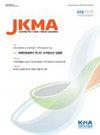In search of Jong Ha Kim, the first Korean medical doctor in modern Daejeon city
IF 0.3
Q3 MEDICINE, GENERAL & INTERNAL
引用次数: 0
Abstract
Background: Recently, it was revealed that Jong-Ha Kim was the first self-employed Korean physician in Daejeon city of South Korea during the Japanese colonial period. However, little is known about him. In this paper, the author aimed to search for historical records of his activities as the first Korean physician in Daejeon city.Current Concepts: Kim’s clinic in Daejeon city was called Chung-Ang Clinic. This is all that has ever been confirmed about Jong-Ha Kim. The author has been searching for his medical record for the last year. Kim’s medical records were collected from journal papers on the modern history of Korea, National Institute of Korean History database, Naver news library archive, official gazette of the Japanese government-general of Korea, database of Seoul National University alumni, and a resume of a professor at the Hamhung Medical School. The results are as follows. He was born in Shinchang-ri Hamheung city Hamgyeongnam-do on August 9, 1900. He graduated from the missionary school established by Canadian missionaries and was admitted to Kyungseong (Keijo) Medical School in 1918. It was recently discovered that he participated in the Independence movement on March 1, 1919. His picture, an old leaflet for his clinic which he had used, and his resume as a professor at the Hamhung Medical School were discovered for the first time.Discussion and Conclusion: The historical records of Jong-Ha Kim’s life provide insight into the lives of contemporary doctors in modern Korea. During the period of 1900 to 1950, which encompasses his historical records, significant events took place in Korean history, and he actively participated in these events. Despite facing numerous difficulties as a doctor in modern Korea, Jong-Ha Kim made decisions that had a great impact. He was a great doctor who served as a good role model.寻找现代大田市的第一位韩国医生金钟河
▽背景=据悉,金钟河是日本帝国主义强占时期大田市的第一位韩国个体医生。然而,人们对他知之甚少。作者的目的是寻找他作为韩国第一个医生在大田市活动的历史记录。目前的概念:金某在大田市的诊所被称为“中央诊所”。这是关于金钟河的全部确认。提交人去年一直在寻找他的医疗记录。金氏的病历收集了韩国近代史期刊论文、国史研究院数据库、Naver新闻图书馆档案、日本总政公报、首尔大学校友数据库、咸兴医科大学教授简历等资料。结果如下:他于1900年8月9日出生在咸镜南道咸兴市新仓里。他毕业于加拿大传教士创办的教会学校,并于1918年被庆城医科大学录取。最近发现他参加了1919年3月1日的独立运动。他的照片和曾经使用过的诊所宣传单、咸兴医科大学教授的履历等都是首次被发现。讨论与结语:通过对金钟河生平的历史记录,我们可以深入了解韩国当代医生的生活。在他记录历史的1900年至1950年期间,韩国历史上发生了重大事件,他积极参与了这些事件。作为现代韩国的一名医生,尽管遇到了许多困难,但金钟河做出了影响深远的决定。他是一位伟大的医生,是一个好榜样。
本文章由计算机程序翻译,如有差异,请以英文原文为准。
求助全文
约1分钟内获得全文
求助全文
来源期刊

Journal of The Korean Medical Association
Medicine-General Medicine
CiteScore
0.50
自引率
0.00%
发文量
84
审稿时长
4-8 weeks
期刊介绍:
The Journal of the Korean Medical Association (JKMA) is the official peer-reviewed, open-access, monthly journal of the Korean Medical Association (KMA). It contains articles in Korean or English. Its abbreviated title is ''J Korean Med Assoc''. The aims of the Journal include contributing to the treatment of and preventing diseases of public health importance and to improvement of health and quality of life through sharing the state-of the-art scientific information on medicine by the members of KMA and other national and international societies.
 求助内容:
求助内容: 应助结果提醒方式:
应助结果提醒方式:


